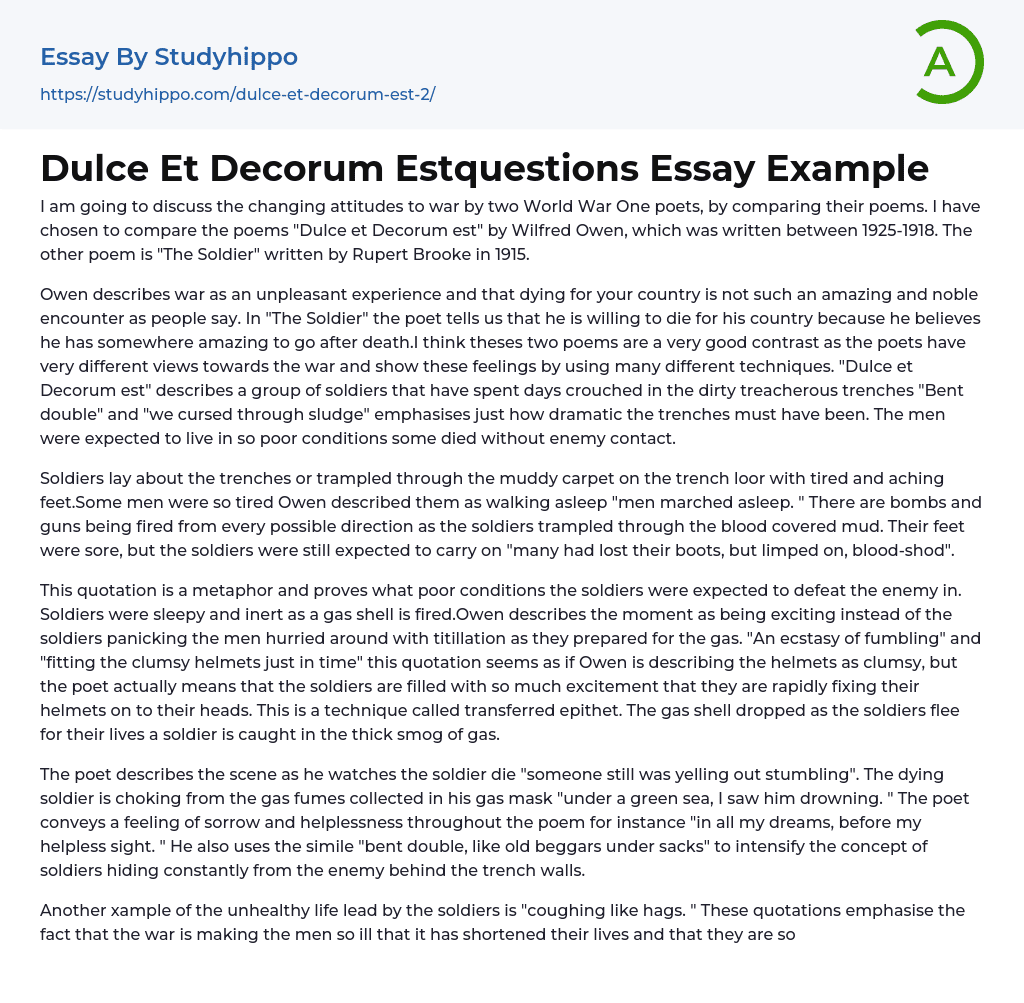I am going to discuss the changing attitudes to war by two World War One poets, by comparing their poems. I have chosen to compare the poems "Dulce et Decorum est" by Wilfred Owen, which was written between 1925-1918. The other poem is "The Soldier" written by Rupert Brooke in 1915.
Owen describes war as an unpleasant experience and that dying for your country is not such an amazing and noble encounter as people say. In "The Soldier" the poet tells us that he is willing to die for his country because he believes he has somewhere amazing to go after death.I think theses two poems are a very good contrast as the poets have very different views towards the war and show these feelings by using many different techniques. "Dulce et Decorum est" describes a group of soldiers that have spent da
...ys crouched in the dirty treacherous trenches "Bent double" and "we cursed through sludge" emphasises just how dramatic the trenches must have been. The men were expected to live in so poor conditions some died without enemy contact.
Soldiers lay about the trenches or trampled through the muddy carpet on the trench loor with tired and aching feet.Some men were so tired Owen described them as walking asleep "men marched asleep. " There are bombs and guns being fired from every possible direction as the soldiers trampled through the blood covered mud. Their feet were sore, but the soldiers were still expected to carry on "many had lost their boots, but limped on, blood-shod".
This quotation is a metaphor and proves what poor conditions the soldiers were expected to defeat the enemy in
Soldiers were sleepy and inert as a gas shell is fired.Owen describes the moment as being exciting instead of the soldiers panicking the men hurried around with titillation as they prepared for the gas. "An ecstasy of fumbling" and "fitting the clumsy helmets just in time" this quotation seems as if Owen is describing the helmets as clumsy, but the poet actually means that the soldiers are filled with so much excitement that they are rapidly fixing their helmets on to their heads. This is a technique called transferred epithet. The gas shell dropped as the soldiers flee for their lives a soldier is caught in the thick smog of gas.
The poet describes the scene as he watches the soldier die "someone still was yelling out stumbling". The dying soldier is choking from the gas fumes collected in his gas mask "under a green sea, I saw him drowning. " The poet conveys a feeling of sorrow and helplessness throughout the poem for instance "in all my dreams, before my helpless sight. " He also uses the simile "bent double, like old beggars under sacks" to intensify the concept of soldiers hiding constantly from the enemy behind the trench walls.
Another xample of the unhealthy life lead by the soldiers is "coughing like hags. " These quotations emphasise the fact that the war is making the men so ill that it has shortened their lives and that they are so unhealthy and injured that they can be described as being old. The poem reflects the poets' feelings towards the war. The poet clearly states that all the young children who are desperate for glory and to
become heroes, not to go to war because from what he has seen, it is not such a sweet and honourable thing to die for country.The poem "The Soldier" written by Rupert Brooke is about a soldier who unlike the soldiers in "Dulce et Decorum est" has never experienced the horrorific sights and sounds of war.
The soldier is pleased about fighting for his country because he believes there is a fantastic and wonderful place to go after daeth that will reward him for his bravery "Washed by the rivers, blest by suns of home". This is very different to Owen's decription towards war as he thinks it is a horrible place and it is not worth dying for your country.
- Book Summary essays
- Metaphor essays
- Reader essays
- Rhyme essays
- Literary devices essays
- Villain essays
- Books essays
- Genre essays
- Literary Criticism essays
- Writer essays
- Protagonist essays
- Simile essays
- Poem essays
- Book Report essays
- Book Review essays
- Greek Mythology essays
- Plot essays
- Tragic Hero essays
- Coming of Age essays
- Play essays
- Rhetoric essays
- Rhetorical Question essays
- Translation essays
- Understanding essays
- Reason essays
- Character essays
- Letter essays
- American Literature essays
- Literature Review essays
- Utopia essays
- Poetry Analysis essays
- Dante's Inferno essays
- Between The World and Me essays
- Incidents in The Life of a Slave Girl essays
- Flowers for Algernon essays
- Myth essays
- Everyday Use essays
- Boo Radley essays
- Genesis essays
- Richard iii essays
- Alice in Wonderland essays
- On the road essays
- Ozymandias essays
- The Nightingale essays
- Holden Caulfield essays
- Animal Farm essays
- 1984 essays
- A Hanging essays
- Shooting An Elephant essays
- A Tale Of Two Cities essays




